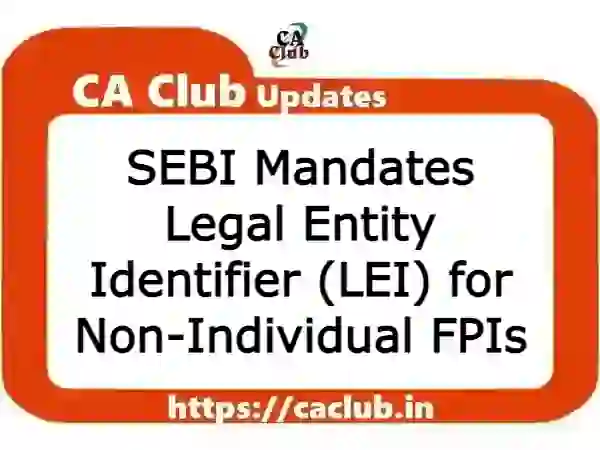SEBI makes Legal Entity Identifier (LEI) mandatory for all non-individual Foreign Portfolio Investors (FPIs), vide Circular dated 27th July, 2023. This unique 20-character code serves as a global identifier for entities engaged in financial transactions and its implementation is seen as a crucial measure post the Global Financial Crisis, to enhance financial data accuracy and risk management.
New Registrations and LEI Details
Now all non-individual FPIs are mandatorily required to provide their unique Legal Entity Identifier (LEI) details in the Common Application Form (CAF) used for their registration, KYC and account opening, which was so far optional/voluntary. Going forward, all new FPI registrations will be processed only after the respective LEI details have been provided.
Compliance and Existing FPIs
Existing FPIs who haven’t already provided their LEIs to their designated Depository Participants (DDPs) must do so within 180 days from the date of this circular, to ensure compliance.
What is LEI?
It’s a unique 20-character code used worldwide to identify separate entities involved in financial transactions. The LEI was introduced after the Global Financial Crisis to improve the accuracy of financial data and enhance risk management. RBI directions also mandate non-individual borrowers with an aggregate exposure of over Rs 25 crore to obtain an LEI code.
Maintaining Active LEI
FPIs need to ensure that their LEI remains active at all times. If an FPI’s LEI code expires or lapses, their accounts will be blocked from making further purchases in the securities market until the LEI code is renewed.
Conclusion
SEBI’s decision to mandate Legal Entity Identifier (LEI) for non-individual Foreign Portfolio Investors (FPIs) marks a significant step towards improving financial data quality and risk management. The use of LEI as a unique identifier for entities engaged in financial transactions is expected to enhance transparency and security in the financial sector. Existing FPIs must promptly provide their LEIs to their Depository Participants to comply with the new regulations, while new FPI registrations will now require LEI details as a mandatory part of the process. By maintaining an active LEI, FPIs can ensure uninterrupted transactions in the securities market and stay on the right side of regulatory compliance.
